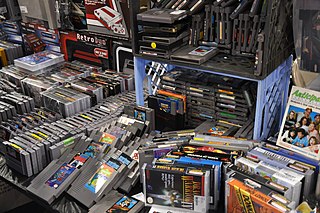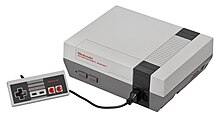The video game crash of 1983 was a large-scale recession in the video game industry that occurred from 1983 to 1985, primarily in the United States. The crash was attributed to several factors, including market saturation in the number of video game consoles and available games, many of which were of poor quality, as well as waning interest in console games in favor of personal computers. Home video game revenues peaked at around $3.2 billion in 1983, then fell to around $100 million by 1985. The crash abruptly ended what is retrospectively considered the second generation of console video gaming in North America. To a lesser extent, the arcade game market also weakened as the golden age of arcade video games came to an end.

The Family Computer Disk System, commonly shortened to the Famicom Disk System or just Disk System, is a peripheral for Nintendo's Family Computer home video game console, released only in Japan on February 21, 1986. It uses proprietary floppy disks called "Disk Cards" for cheaper data storage and it adds a new high-fidelity sound channel for supporting Disk System games.

A video rental shop/store is a physical retail business that rents home videos such as movies, prerecorded TV shows, video game discs and other media content. Typically, a rental shop conducts business with customers under conditions and terms agreed upon in a rental agreement or contract, which may be implied, explicit, or written. Many video rental stores also sell previously viewed movies and/or new, unopened movies.
Copy protection, also known as content protection, copy prevention and copy restriction, describes measures to enforce copyright by preventing the reproduction of software, films, music, and other media.

Blockbuster LLC, formerly known as Blockbuster Video, was an American-based provider of home video and video game rental services. Services were offered primarily at video rental shops, but later alternatives included DVD-by-mail, streaming, video on demand, and cinema theater. Previously operated by Blockbuster Entertainment, Inc., the company expanded internationally throughout the 1990s. At its peak in 2004, Blockbuster consisted of 9,094 stores and employed approximately 84,300 people: 58,500 in the United States and 25,800 in other countries.
The first-sale doctrine is an American legal concept that limits the rights of an intellectual property owner to control resale of products embodying its intellectual property. The doctrine enables the distribution chain of copyrighted products, library lending, giving, video rentals and secondary markets for copyrighted works. In trademark law, this same doctrine enables reselling of trademarked products after the trademark holder puts the products on the market. In the case of patented products, the doctrine allows resale of patented products without any control from the patent holder. The first sale doctrine does not apply to patented processes, which are instead governed by the patent exhaustion doctrine.
Software copyright is the application of copyright in law to machine-readable software. While many of the legal principles and policy debates concerning software copyright have close parallels in other domains of copyright law, there are a number of distinctive issues that arise with software. This article primarily focuses on topics particular to software.

The Video Privacy Protection Act (VPPA) is a bill that was passed by the United States Congress in 1988 as Pub.L. 100–618 and signed into law by President Ronald Reagan. It was created to prevent what it refers to as "wrongful disclosure of video tape rental or sale records [or similar audio visual materials, to cover items such as video games and the future DVD format]." Congress passed the VPPA after Robert Bork's video rental history was published during his Supreme Court nomination. It makes any "video tape service provider" that discloses rental information outside the ordinary course of business liable for up to $2500 in actual damages.

A video game clone is either a video game or a video game console very similar to, or heavily inspired by, a previous popular game or console. Clones are typically made to take financial advantage of the popularity of the cloned game or system, but clones may also result from earnest attempts to create homages or expand on game mechanics from the original game. An additional motivation unique to the medium of games as software with limited compatibility, is the desire to port a simulacrum of a game to platforms that the original is unavailable for or unsatisfactorily implemented on.

A video game console emulator is a type of emulator that allows a computing device to emulate a video game console's hardware and play its games on the emulating platform. More often than not, emulators carry additional features that surpass the limitations of the original hardware, such as broader controller compatibility, timescale control, greater performance, clearer quality, easier access to memory modifications, one-click cheat codes, and unlocking of gameplay features. Emulators are also a useful tool in the development process of homebrew demos and the creation of new games for older, discontinued, or rare consoles.

Lewis Galoob Toys, Inc. v. Nintendo of America, Inc. is a 1992 legal case where the Ninth Circuit Court of Appeals concluded that there was no copyright infringement made by the Game Genie, a video game accessory that could alter the output of games for the Nintendo Entertainment System. The court determined that the Galoob did not violate Nintendo's exclusive right to make derivative works of their games, because the Game Genie did not create a new permanent work. The court also found that the alterations produced by the Game Genie qualified as non-commercial fair use, and none of the alterations were supplanting demand for Nintendo's games.

The Nintendo Entertainment System (NES) is an 8-bit third-generation home video game console produced by Nintendo. It was first released in Japan in 1983 as the Family Computer (FC), commonly known as the Famicom. The NES, a redesigned version, was released in American test markets on October 18, 1985, before becoming widely available in North America and other countries.

The Digital Millennium Copyright Act (DMCA) is a 1998 United States copyright law that implements two 1996 treaties of the World Intellectual Property Organization (WIPO). It criminalizes production and dissemination of technology, devices, or services intended to circumvent measures that control access to copyrighted works. It also criminalizes the act of circumventing an access control, whether or not there is actual infringement of copyright itself. In addition, the DMCA heightens the penalties for copyright infringement on the Internet. Passed on October 12, 1998, by a unanimous vote in the United States Senate and signed into law by President Bill Clinton on October 28, 1998, the DMCA amended Title 17 of the United States Code to extend the reach of copyright, while limiting the liability of the providers of online services for copyright infringement by their users.

KPS Video Express (金獅影視超特店) was a Hong Kong-based multimedia store which sold and rented videos, CDs and movies. It was established in 1981 by Garrie and Kitty Roman, and by 1997 expanded to 39 stores with 450,000 members. It also had stores in Taiwan, with further plans to expand in the Asian region.

Sega Enterprises Ltd. v. Accolade, Inc., 977 F.2d 1510, is a case in which the United States Court of Appeals for the Ninth Circuit applied American intellectual property law to the reverse engineering of computer software. Stemming from the publishing of several Sega Genesis games by video game publisher Accolade, which had disassembled Genesis software in order to publish games without being licensed by Sega, the case involved several overlapping issues, including the scope of copyright, permissible uses for trademarks, and the scope of the fair use doctrine for computer code.

Vernor v. Autodesk, Inc. was a case in the United States District Court for the Western District of Washington regarding the applicability of the first-sale doctrine to software sold under the terms of so-called "shrinkwrap licensing." The court held that when the transfer of software to the purchaser materially resembled a sale it was, in fact, a "sale with restrictions on use" giving rise to a right to resell the copy under the first-sale doctrine. As such, Autodesk could not pursue an action for copyright infringement against Vernor, who sought to resell used versions of its software on eBay. The decision was appealed to the United States Court of Appeals for the Ninth Circuit, which issued a decision on September 10, 2010, reversing the first-sale doctrine ruling and remanding for further proceedings on the misuse of copyright claim. The Ninth Circuit's decision asserted that its ruling was compelled by Ninth Circuit precedent, but observed that the policy considerations involved in the case might affect motion pictures and libraries as well as sales of used software.

Columbia Pictures Industries, Inc. v. Redd Horne, Inc., 749 F.2d 154 was a copyright infringement case of the United States Court of Appeals for the Third Circuit over the playing video cassettes in-store of a video sale and rental store. The appeals court affirmed the decision of the district court to grant the plaintiffs' motion for summary judgment and enjoin defendants from exhibiting plaintiffs' copyrighted motion pictures.

The R4 is a flash cartridge for the Nintendo DS handheld system. It allows ROMs and homebrew to be booted on the Nintendo DS handheld system from a microSD card. This allows the user to run homebrew applications, to store multiple games and MP3 music files on a single memory card, and to play games that have been backed up by the user.

Atari Games Corp. v. Nintendo of America Inc., 975 F.2d 832, is a United States Court of Appeals for the Federal Circuit case, in which Atari Games engaged in copyright infringement by copying Nintendo's lock-out system, the 10NES. The 10NES was designed to prevent Nintendo's video game console, the Nintendo Entertainment System (NES), from playing unauthorized game cartridges. Atari, after unsuccessful attempts to reverse engineer the lock-out system, obtained an unauthorized copy of the source code from the Copyright Office and used it to create its 10NES replica, the Rabbit. Atari then sued Nintendo for unfair competition and copyright misuse, and Nintendo responded that Atari had engaged in unfair competition, copyright infringement, and patent infringement.

Video game preservation is a form of preservation applied to the video game industry that includes, but is not limited to, digital preservation. Such preservation efforts include archiving development source code and art assets, digital copies of video games, emulation of video game hardware, maintenance and preservation of specialized video game hardware such as arcade games and video game consoles, and digitization of print video game magazines and books prior to the Digital Revolution.

















